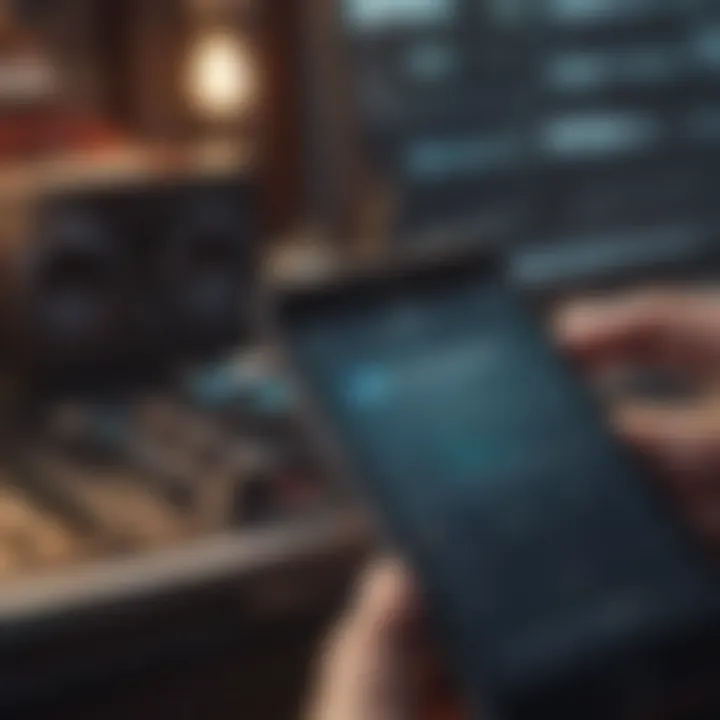How to Create Custom Ringtones for Apple Devices


Intro
Creating custom ringtones offers a personal touch to your Apple device, enhancing the user experience by transforming an everyday function into a unique expression of your personality. In today’s information-rich age, infusing identity into mundane aspects of technology is highly relevant. However, many users may not be aware of the various methods available for designing ringtones. This guide aims to unfold the technical nuances, software tools, and considerations involved in creating your tones.
Product Overview
First, it is important to consider the iPhone itself, specifically tailored for users looking to enhance their mobile experience. The latest models, such as the iPhone 15, come embedded with advanced software capabilities. The devices typically boast features like one of the best user interfaces and fluid operating system interactions, making it easier to modify aspects like ringtones.
Preface to the Apple product
The iPhone 15 is part of Apple’s potent lineup featuring the A16 Bionic chip, capable of handling substantial multitasking effortlessly. It helps in managing audio editing software instantly and reflects the seamless integration of Apple’s ecosystem.
Key features and specifications of the product
The key specifications include:
- Display: 6.1-inch Super Retina XDR
- Camera: Dual 12MP system utilizing advanced computational photography
- Battery Life: Enhanced itowers for better battery performance
Available variants/colors of the product
The iPhone 15 series comes in various colors, enhancing personalization. The available options usually consist of:
- Starlight
- Midnight
- (PRODUCT)RED
- Blue
- Pink
Design and Build Quality
Moving to the design aspects of the iPhone 15, it symbolizes Apple's renowned design language, encapsulating refined elegance blended with exceptional build quality.
Visual description of the device's design
The rectangle formens a sleek profile with round edges that feels comfortable during use. Its lightweight design ensures that it can be used during many tasks.
Materials used in the construction
Apple utilizes premium materials across all models, including surgical-grade stainless steel, making the device durable while maintaining a light weight.
Ergonomics and overall build quality assessment
Users constantly report a firm and balanced kingship in their hand while operating the iPhone. It offers a comprehensive tactile experience evident in its build- vfeedback mechanism.
Performance and User Experience
The cornerstone of the iPhone experience relates to how it performs tasks including ringtone creation.
Processor details and performance benchmarks
Powering the iPhone is the A16 Bionic chip featuring a 6-core CPU. It ensures excellent performance levels even scanning through extensive audio files with minimal lag.
User interface and operating system features
iOS is intuitively designed with functionalities specifically tailored for simple ease. This simplicity benefits users adapting audio editing tools to create custom ringtones, such as GarageBand and iTunes.
Multitasking capabilities and overall user experience
The multitasking smooth reliably lets users switch between creating playlists and managing ringtones, thereby enriching the synergy of the User experience for creativity.
Camera and Media Capabilities
For many people, audio explodes in fusion with the desire for visual stimuli. Hence, understanding the unit's audio capacity rests on its auditory side as well, ensuring ringtones resonate perfectly.


Camera specifications and sample images
Alongside camera prowess, the media qualities are built notably in for playback of high-quality audio files. 12-megapixel cameras might seem not directly pertinent, but one can incorporate cyclic audio functions, enhancing video-editing accompanied by good audio.
Video recording capabilities and supported formats
This device supports significant recording innovation like 4K at 60 fps. Higher quality audio ready achievable can also serve for ringtones.
Audio quality and media consumption experience
Blooming experiences depend on not only how ringtones cut but connect emotionally, possessing spatial audio capabilities importantly perceived while consuming media content.
Pricing and Availability
Accessibility bestows even creative individuals.
Pricing options for different variants
Typically, the price range sits primarily within premium boundaries, starting around $799 and varying based on configurations and internal storage.
Availability in various regions/markets
Apple has successfully made devices available across various regions, promoting devices across several platforms including retail and online.
Comparison with competitor products in terms of value for money
Amid strata of other brands, iPhone continues leading premium markets demonstrating broader purposes compatible closely striking value through sound personalization, inspiring user enjoyment widely.
Overall, the elegance of the iPhone ecosystem incorporates numerous tools and frameworks promoting captivating user experiences that can enrich one’s audio landscape into custom ringtones.
Prologue to Custom Ringtones
Creating custom ringtones is becoming a significant trend among many device owners, especially users of Apple products. When a distinct sound not only informs but also reflects one’s personality, it enhances the overall user experience. As such, understanding the methods on how to create these personalized audio alerts adds a layer of satisfaction to everyday mobile usage.
In this section, we will delve into the foundational aspects of ringtones, their importance, and the appeal of personalized sounds.
Understanding Ringtones
A ringtone is an audio signal that jewelry your mobile device, indirectly connecting you to a person through sound. These audio cues can range from default tones offered by smartphone manufacturers to fully customized sound bites created from your favorite songs or unique recordings. Ringtones have evolved far beyond their functional purpose; nowadays, they have become a creative outlet for many users.
A ringtone does not serve just a notification role. It reflects personal identity and style. A unique ringtone can help distinguish your calls in crowded places or act as an auditory signature. Importantly, the quality and format of the selected clip can significantly affect how you perceive alerts, so diving deeper into these aspects becomes imperative, especially for those looking to fine-tune their experience.
The Appeal of Customization
The customization of ringtones appeals strongly to many Apple users for numerous reasons:
- Personal expression: Ringtones offer a way to express individuality. Whether it's a snippet of classical music, a contemporary hit, or even a spoken phrase, customizing adds a personal touch to an otherwise generic phone setup.
- Recognition: Individualized tones make it easy to recognize who is calling, even when reaching for your phone in a busy environment. Connecting a tone with a person can evoke immediate cognitive recognition, simplifying decision-making on how to respond to incoming calls.
- Creativity Outlet: Engaging in ringtone creation offers an enjoyable avenue for creativity. Editing and appropriating audio tracks can be a fulfilling task for many enthusiasts. Leveraging familiar software and tools allows users to harness their technical skills to create soundscapes that resonate personally.
Available Methods for Creating Ringtones
Creating your own ringtones enhances personalization for Apple devices. Understanding various methods simplifies the process while permitting creativity. In this section, we will explore different techniques to craft ringtones, from traditional software to contemporary applications.
Using iTunes
iTunes presents a well-known method to design custom ringtones. It is particularly advantageous because it interfaces directly with Apple products. The main features include a user-friendly interface and straightforward syncing options. While it suits most users, it can feel limited for those seeking extensive customization.
Setting Up Your iTunes Library
Preparing your iTunes library is the foundational step. Import your favorite music files and familiarize yourself with your content. A neat library aids in swift navigation, facilitating a more accurate ringtone selection. This usability is significant, as organized libraries help reduce frustration. Having your song metadata clear will contribute positively to locating and selecting songs promptly.
Choosing and Editing a Song


Selecting the right song is critical to creating a custom ringtone. Opt for tracks with memorable hooks or parts that resonate. With the editing tool in iTunes, you can clip sections of your desired song effectively. This feature allows concise control over duration, adjusting length to fit within standard ringtone limits. Ensuring that you work from a high-quality source track will yield better sound results.
Creating the Ringtone File
Following the song editing, the next step is to create the ringtone file. You need to convert your trimmed audio into the proper format, typically M4R for iPhone compatibility. This unique process simplifies integration. Moreover, this method only requires a basic understanding of file management, making it accessible.
Syncing with Your Device
Once the ringtone file is created, transfer it to your iPhone. Using iTunes for this step complements previous operations efficiently. Syncing ensures that the new ringtones integrate properly with your device settings. Checking on your device for updates post-sync is prudent, helping prevent any device glitches prefaced with fresh content.
Using GarageBand
GarageBand is another robust option for ringtone creation. This application allows for comprehensive audio manipulation. Using GarageBand gives you access to numerous instruments and sound samples. The primary disadvantages are the initial learning curve and space requirements for the app itself. For users quite comfortable with digital audio workstations, it stands as an excellent choice.
Exploring GarageBand's Features
GarageBand allows you to summon creativity through its numerous tools. Features include loop imports, flexible editing timelines, and multi-track recording. You can customize ringtones far beyond basic cuts, crafting original audio experiences tailored meticulously. Especially suitable for musicians or users seeking artistic expression, it broadens the spectrum of possibilities compared to iTunes alone.
Importing and Editing Audio Tracks
Importing audio tracks in GarageBand is straightforward. Once imported, you can manipulate clips extensively; using an wide-ranging array of audio effects, synths, and samples. This feature elevates the editing experience beyond simple trimming. However, it requires user familiarity to capitalize on offered strengths fully.
Exporting as Ringtone
Exporting final audio as a ringtone is mostly simplified. GarageBand automatically offers the option, saving the completed file in a compatible format. Such convenience contributes to an appealing final product. Considerations on audio character are required to ensure ringtone success upon playback on devices, which is essential for longer tracks to maintain audible clarity.
Transferring to Your iPhone
Finally, once exported, transferring to iPhone necessitates specific steps through iTunes. While the process combines with accessing earlier designed ringtones, understanding this link is crucial. Make sure everything syncs precision to an individual device. This can potentially be confusing but thorough guides exist if further complications arise.
Third-Party Applications
Third-party apps expand choices available for ringtone creation. Alternatives like Ringtone Maker and Zedge provide quick services with easy interfaces. They may lack customization depth often found in GarageBand. Although their processes are rapidly paced, quick results typically appeal to users prioritizing time efficiency.
Overview of Popular Applications
Researching user favorites exposes many broadly supported options. Ringtone Maker often gets cited for streamlined operations. Zedge stands released successfully by catering robustly to popular music tastes effectively. Both tend to lack extensive editing tools, yet they remain handy solutions without setup intricacies.
Step-by-Step Instructions for Each App
Typically, these applications flourish due to simplicity. Stepwise guidance for Zedge or similar might entail basic song selection followed by final upload processes clarified further once processed. Yet, always assess instruction clarity, when seeking capabilities further in-depth.
Pros and Cons of Third-Party Solutions
These applications furnish users less burden of comprehensive audio knowledge. Convenience drives nhu ease presented for newer users as strong incentives. Yet, dependency could emerge on external applications, fostering skepticism regarding originality and uniqueness. Balance here is significant, favoring regular intervals of more tactical, in-house methods alongside possibly deeper satisfaction when investing time.
Custom ringtones bring more personal flair decrease the likelihood of missed calls by making unique sound options more visible.
Legal Considerations
Creating custom ringtones involves various aspects of legality. This section covers important elements to consider while developing your own sound files for ringtones. Ignoring legal issues could lead to unwanted complications, such as copyright infringement or licensing issues. Proactively addressing these matters helps ensure that your creative endeavors remain worry-free, particularly in a digital landscape that is tightly governed by intellectual property laws.
Understanding Copyright
Copyright law is fundamental when you create ringtones. Generally, songs and audio recordings are protected by copyright upon creation. This means you cannot just use any song without consent from the rights owner. Doing so can result in legal penalties, including fines and potentially more severe consequences.
To navigate copyright laws effectively, familiarize yourself with the following points:
- Copyright gives the creator exclusive rights to their work. This can include the right to reproduce, distribute, and publicly perform the piece.
- Using copyrighted material without permission can lead to claims of infringement which might require financial compensation to the rights holder.
- The duration of copyright persists for the life of the creator plus a given number of years, usually within 70 years, after which the work may enter the public domain.
To be safe, consider obtaining necessary licenses or opting for royalty-free audio instead.


Legal Alternatives for Ringtones
If you are keen on avoiding copyright issues but still want custom ringtones, there are legal alternatives available. These options allow for creativity while keeping you compliant with laws. Here are some suggestions:
- Royalty-Free Music: Many websites offer tracks that are copyright-free. You can adapt such music for personal use without repercussions. Look for resources like SoundCloud or Free Music Archive.
- Creative Commons: Some artists release their work under Creative Commons licenses. Just check the type of license to understand permitted uses before utilizing them as ringtones.
- Ringtone Apps: Several apps found in the App Store offer a selection of legally cleared music or sound effects. These applications allow users easily to choose and customize ringtones without legal repercussions.
Ultimately, being aware of legal considerations while creating ringtones is critical. When respected, such knowledge enables your projects to be both innovative and legally sound.
Audio Editing Tips
When creating your custom ringtones, audio editing is a pivotal aspect of the process. It is essential to ensure that the chosen audio clip not only fits musically but also sounds crisp and clear when played on your device. Proper editing affects both quality and personal expression. Here are a few elements to consider:
- Format Compatibility: Always ensure that the chosen audio file is compatible with your device. Apple devices typically support formats like AAC and MP3. Using unsupported formats can lead to frustration when syncing the ringtone.
- Length and Looping: The ideal length for a ringtone can vary. Many users prefer shorter segments, usually between 30 seconds to a minute. However, Apple’s official specification allows ringtones up to one minute. Ensure the chosen section loops smoothly if intended to do so. This aspect can significantly affect how the ringtone feels when it plays repeatedly.
- Conciseness: Identify structural elements you want to highlight which resonate with you. This could be a memorable hook, notable lyrics, or an instrumental break. Trim out unnecessary sections to maintain engagement.
Choosing the Right Audio Clip
Selecting the right audio clip is the bedrock of any ringtone creation. The chosen clip should reflect personal tastes and function practically. Consider the following points:
- Personal Resonance: Choose a song or audio that holds personal significance. It could be anything from a favorite movie line to a chorus from a beloved song.
- Popular Choices: Current hits or classic tunes often make great ringtones due to their recognizability. Songs by artists such as Taylor Swift, Drake, and Ed Sheeran are frequently used, as popular tunes tend to be user-friendly.
- Sound Quality: Ensure that your selected audio clip is of high quality. Low-quality audio may sound distorted when it’s played as a ringtone, thus diminishing the musical experience.
- **Source and $>Accessibility$: You can find audio clips on various platforms like YouTube or SoundCloud. However, remember always to check if the platform allows downloads that comply with legal standards.
Editing Techniques to Consider
Editing audio clips may seem intimidating at first, but a few techniques can improve your ringtone's appeal:
- Fading: Implement fade in and fade out techniques to create a smoother listening transition. This is particularly useful if the selected audio starts too abruptly but will still seem designed nicely.
- Volume Adjustment: Make sure the volume levels are balanced. If one part is significantly louder or softer than the rest, adjust accordingly for consistency.
- Using Software: Tools like GarageBand or Audacity offer various functions for sound adjustments. They allow you to cut, trim, and apply different audio effects. Choose software that aligns with your level of expertise.
- Preview Frequently: Bench mark your editing progress by frequently playing back the modified audio clip. This allows you to catch any mistakes early, reducing frustration later.
When attaching editing techniques to your selected clip, these strategies craft not just a ringtone but an auditory signal that is individual and appealing. Crafting your ringtone guarantees a unique identity for each notification.
Troubleshooting Common Issues
When creating custom ringtones, users may encounter certain obstacles impacting their experience. Addressing these problems helps to enhance user satisfaction and maintain seamless functionality of their devices. This section focuses on two main issues: when the ringtone does not appear on the device and concerns regarding audio quality. Troubleshooting these points is crucial to ensure that the created ringtones function as intended and sound great.
Ringtone Not Appearing on Device
If a ringtone does not appear on an Apple device, several factors might contribute to this frustrating situation. Understanding the common reasons behind this issue can help users resolve it more effectively. Here are some potential causes to consider:
- Sync Issues: Sometimes, when syncing your device with iTunes, the ringtones may not transfer as expected. Ensure that syncing preferences are set correctly in iTunes.
- File Format Problems: Apple devices have specific supported formats for ringtones. Check that the file is in the correct format, which is typically .m4r for iTunes.
- Ringtone Settings: Verify that the created ringtone is selected as the default for notifications or specific contacts. Without proper settings, it might appear inactive even if it exists.
- Device Restart Needed: A simple yet often overlooked solution is restarting the device. This can resolve temporary issues leading to the ringtone not displaying.
By following these steps, users may quickly fix the ringtone not appearing issue, enhancing their overall create-and-use experience of custom ringtones.
Audio Quality Concerns
Audio quality is a vital aspect when selecting and creating ringtones. Low-quality audio can diminish the intended experience and may cause frustrations when using a unique ringtone. Below are several considerations that can help enhance the audio quality:
- Source Quality: Start with high-resolution audio files. Files with higher bitrate generally result in a clearer sound. For example, a 320 kbps MP3 is preferable over a 128 kbps.
- Editing Skills: Utilize audio editing tools carefully to balance volume levels and remove background noise. A well-edited ringtone will enhance clarity in sound.
- Playback Testing: Always play the ringtone on your device to evaluate its audio quality before finalizing. If it sounds muffled or distorted, troubleshoot your audio settings or re-edit the clip.
- Volume Levels: Be mindful of the volume levels which can impact auditory experience. Too loud can create distortion, while too soft can lead to decreased effectiveness.
End
In summary, creating your own ringtones not only adds a personal touch to your mobile experience, but also allows for increased creativity and self-expression. This article's primary focus was on guiding you through various methodologies that enable customization, including native tools like iTunes and GarageBand, alongside several third-party applications. Each method has unique strengths, offering flexibility depending on your technical comfort level and specific needs.
Recap of Key Steps
- Choose Your Method: Select a highlighted method suitable for your device. You can use iTunes, GarageBand, or a trusted third-party app.
- Select Audio: Find a sound clip that resonates with you. Don’t forget to edit it if necessary to suit the timeframe of a ringtone.
- Create Ringtone: Follow the respective instructions for your chosen method to generate the ringtone file. This could involve exporting in a set format or converting audio tracks.
- Transfer: Once your ringtone is prepared, sync it with your device to enable the new sound.
- Test: Finally, make sure to test the ringtone, checking its clarity and ensuring it plays properly on your device.
Even with distinct methods, the aim remains consistent—personalization of your device in alignment with individuality.
Encouragement to Explore Creativity
Beyond merely setting a ringtone, this task invites you to dive into audio creativity. Consider exploring songs which carry sentimental value or distinct sounds from films. You can stitch audio clips together or overlay different effects using audio editing software.
Every editing session can lead to discovering unique sounds that resonate with your identity. Don't hesitate to engage in a little experimentation. Engaging your creativity can turn the atmosphere of a simple ringtone into an emotional expression.
For suggestions, look for resources on sound libraries available online or discussions on platform like Reddit regarding interesting sounds to explore or unusual themes related to popular tracks.
The process of ringtone creation transcends mere functionality; it is a canvas for personal narrative right from your pocket.
In end, don't shy away from trying new apps or features. Challenges in technology can lead to more innovative outcomes, adding depth to your phone beyond what's common and typically user-friendly. Embrace this with confidence and watch your ideas unfold beautifully.















